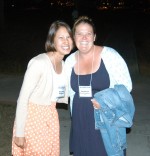The Graduate Student Symposium (GSS) at the 2012 All Scientists Meeting (ASM) was a resounding success. The GSS took place one day before ASM officially started, and included about 150 graduate students from across the Long Term Ecological Research (LTER) Network, about three quarters of whom were attending their first ASM. We had a great time getting to know each other and learned a lot throughout the day.
Our theme for the symposium was “Thinking outside the ecological box: Incorporating additional disciplines in ecological research.” Dr. Nancy Grimm from the Central Arizona-Phoenix (CAP) LTER gave the plenary address. Drawing on the unique perspectives she gained from her two “perches” as the lead PI of CAP LTER and as an NSF program officer, Grimm discussed with us the why, what, where, who, and how of working across disciplines.
We also saw presentations by three graduate students who have incorporated other disciplines into their ecological research. First was Sakura Evans (CWT), who discussed the use of social science techniques to examine why land owners continue using techniques that degrade riparian zones in the southern Appalachian Mountains. Next, Sarah Frey Hadley (AND and HBR) walked us through collaborative work she has done with computer scientists to examine single- and multi-species distributions of birds and to identify bird songs from field recordings using machine learning. Finally, Rebecca Hale (CAP) discussed how she is working within engineered systems in Phoenix, Arizona to examine water flow in the city. These fellow student speakers all encouraged us to think about how we can each incorporate other disciplines into our ecological research within a time scale relevant to our dissertations.
The last activity of the morning brought together a panel of Principal Investigators who work across disciplines, including Drs. Grimm, Nik Heynan (CWT; social science), Mary Spivey (CDR; citizen science), and Dave Gutzler (SEV; climatology), to share their experiences and advice on how to incorporate additional disciplines into ecological research during our dissertation work and beyond.
We spent the afternoon in a series of concurrent working groups, organized and led by graduate students. Participants had the option to attend any group, with discussion topics covering issues such as patchiness in plant communities, identifying best practices, and how to conduct cross-disciplinary research. The working groups were all well attended and we expect many to result in ongoing collaborations, including data synthesis projects and starting up new cross-site experiments.
Overall, the day was a resounding success. We all left feeling a little brain-weary, but full of excitement for future collaborations and continued friendships.
By Kim LaPierre, GSC co-chair (KNZ)

 Enlarge this image
Enlarge this image

